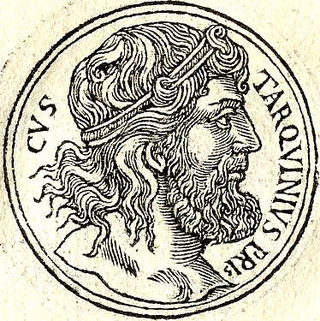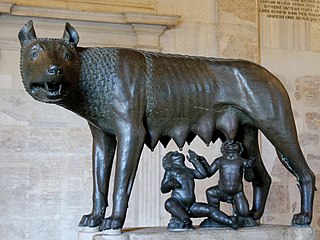
Lucius Tarquinius Priscus, or Tarquin the Elder, was the legendary fifth king of Rome and first of its Etruscan dynasty. He reigned for thirty-eight years. Tarquinius expanded Roman power through military conquest and grand architectural constructions. His wife was the prophetess Tanaquil.

Nuclear physics is the field of physics that studies atomic nuclei and their constituents and interactions, in addition to the study of other forms of nuclear matter.

Magnus Maximus was Roman emperor in the West from 383 to 388. He usurped the throne from emperor Gratian.

In Roman mythology, King Numitor of Alba Longa was the maternal grandfather of Rome's founder and first king, Romulus, and his twin brother Remus. He was the son of Procas, descendant of Aeneas the Trojan, and father of the twins' mother, Rhea Silvia, and Lausus.

Tullus Hostilius was the legendary third king of Rome. He succeeded Numa Pompilius and was succeeded by Ancus Marcius. Unlike his predecessor, Tullus was known as a warlike king who, according to the Roman historian Livy, believed the more peaceful nature of his predecessor had weakened Rome. It has been attested that he sought out war and was even more warlike than the first king of Rome, Romulus. Accounts of the death of Tullus Hostilius vary. In the mythological version of events Livy describes, he had angered Jupiter who then killed him with a bolt of lightning. Non-mythological sources on the other hand describe that he died of plague after a rule of 32 years.

The Matter of Britain is the body of medieval literature and legendary material associated with Great Britain and Brittany and the legendary kings and heroes associated with it, particularly King Arthur. The 12th-century Welsh cleric Geoffrey of Monmouth's Historia Regum Britanniae, widely popular in its day, is a central component of the Matter of Britain.

Historia regum Britanniae, originally called De gestis Britonum, is a pseudohistorical account of British history, written around 1136 by Geoffrey of Monmouth. It chronicles the lives of the kings of the Britons over the course of two thousand years, beginning with the Trojans founding the British nation and continuing until the Anglo-Saxons assumed control of much of Britain around the 7th century. It is one of the central pieces of the Matter of Britain.

The House of Munsö, also called the House of Björn Ironside, the House of Uppsala or simply the Old dynasty, is the earliest reliably attested royal dynasty of Sweden, ruling during the Viking Age. None of the names suggested for the dynasty are universally accepted and most are problematic; the name "House of Munsö" derives from a questionable and speculative theory that they would have ruled from the island of Munsö and the name "House of Björn Ironside" derives from the supposed founder of the dynasty, Björn Ironside, who is often seen as a legendary, rather than historical, figure.

In physics, specifically field theory and particle physics, the Proca action describes a massive spin-1 field of mass m in Minkowski spacetime. The corresponding equation is a relativistic wave equation called the Proca equation. The Proca action and equation are named after Romanian physicist Alexandru Proca.

The kings of Alba Longa, or Alban kings, were a series of legendary kings of Latium, who ruled from the ancient city of Alba Longa. In the mythic tradition of ancient Rome, they fill the 400-year gap between the settlement of Aeneas in Italy and the founding of the city of Rome by Romulus. It was this line of descent to which the Julii claimed kinship. The traditional line of the Alban kings ends with Numitor, the grandfather of Romulus and Remus. One later king, Gaius Cluilius, is mentioned by Roman historians, although his relation to the original line, if any, is unknown; and after his death, a few generations after the time of Romulus, the city was destroyed by Tullus Hostilius, the third King of Rome, and its population transferred to Alba's daughter city.

Aventinus, one of the mythical kings of Alba Longa, who was buried on the Aventine Hill later named after him. He is said to have reigned thirty-seven years, and to have been succeeded by Procas, the father of Amulius.

The king of Rome was the ruler of the Roman Kingdom. According to legend, the first king of Rome was Romulus, who founded the city in 753 BC upon the Palatine Hill. Seven legendary kings are said to have ruled Rome until 509 BC, when the last king was overthrown. These kings ruled for an average of 35 years.

The Pharnavazid is the name of the first dynasty of Georgian kings of Kartli (Iberia) preserved by The Georgian Chronicles. Their rule lasted, with intermissions, from the 3rd century BC to the 2nd century AD. The main male line is reported to have become extinct early on and followed by houses related to it in the female line. By the close of the 2nd century AD, the Pharnavazid rule came to an end and the Arsacid dynasty took over the crown of Iberia.
Proculus is a Latin praenomen, or personal name, which was most common during the early centuries of the Roman Republic. It gave rise to the patronymic gentes Proculeia and Procilia, and later became a common cognomen, or surname. The feminine form is Procula. The name was not regularly abbreviated.

Alexandru Proca was a Romanian physicist who studied and worked in France. He developed the vector meson theory of nuclear forces and the relativistic quantum field equations that bear his name for the massive, vector spin-1 mesons.
A legendary progenitor is a legendary or mythological figure held to be the common ancestor of a dynasty, people, tribe or ethnic group.

The gens Procilia, sometimes written Procillia, was a minor plebeian family at ancient Rome. Members of this gens are first mentioned during the final century of the Republic, but few of them obtained any position of importance in the Roman state, and they are best known as a result of the historian Procillius, a contemporary of Cicero, whose work has been lost, but who was cited as a source by the Roman antiquarians.
The gens Proculeia was a minor plebeian family at ancient Rome. Members of this gens are first mentioned at the end of the Republic. Gaius Proculeius was one of the most trusted friends and advisers of Octavian, and one of those whom he considered a possible heir. None of the Proculeii ever obtained the consulship, but a number are known from inscriptions.
The gens Silvia was a minor plebeian family at ancient Rome. According to legend, the Silvii were the royal dynasty of Alba Longa, Rome's mother city, and presumably came to Rome when that city was destroyed by Tullus Hostilius in the seventh century BC. Notwithstanding their connection with Rome's foundation myths, the Silvii were plebeians, and hardly any members of this gens played a significant role in history. However, from inscriptions, several Silvii appear to have had distinguished military careers, and Silvius Silvanus was governor of Moesia Inferior in the time of Diocletian.















